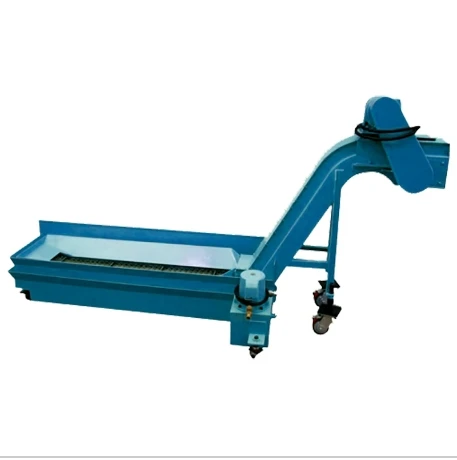cnc mill chip conveyor
The Importance of CNC Mill Chip Conveyors in Modern Manufacturing
In the realm of modern manufacturing, particularly within CNC (Computer Numerical Control) machining, efficiency and productivity are paramount. One of the critical components that plays an integral role in achieving these objectives is the CNC mill chip conveyor. These conveyors are designed to remove metal chips and debris generated during the milling process, thus ensuring a smoother workflow and maintaining the integrity of both the equipment and the product.
What is a CNC Mill Chip Conveyor?
A CNC mill chip conveyor is a mechanical device used to transport metal shavings, chips, and coolant away from the milling machine. During the machining process, various operations can generate a substantial amount of waste material. This waste, if not adequately managed, can lead to several issues, including machine downtime, potential damage to parts, and decreased overall efficiency.
Chip conveyors are engineered to handle a wide variety of materials, including aluminum, steel, brass, and plastics. Depending on the application and the nature of the chips produced, different types of conveyors may be employed, such as belt conveyors, hinged steel belt conveyors, or even magnetic conveyors. Each type has its unique advantages, tailored to specific environments and requirements.
The Role of Chip Conveyors in CNC Machining
1. Enhanced Efficiency By continuously removing chips from the work area, CNC mill chip conveyors help maintain the machining process's flow. This allows operators to focus on their tasks without worrying about frequent interruptions to clear debris.
2. Improved Tool Life Excess chips can interfere with cutting tools, leading to premature wear and potential tool failure. Chip conveyors help minimize this risk by ensuring that leftover materials are promptly removed, thus extending the longevity of expensive tooling.
3. Reduction in Downtime With a chip management system in place, the need for manual intervention is significantly reduced. This means operators can dedicate more time to production rather than dealing with machine maintenance, such as cleaning out chips. As a result, overall downtime is lessened, leading to higher productivity levels.
cnc mill chip conveyor

4. Safety Metal chips can pose safety hazards in a manufacturing environment. They can cause slips, trips, and falls or lead to injuries when machinery is not adequately maintained. An efficient chip conveyor system helps to minimize these risks by ensuring that the work area is kept clean and free of hazardous debris.
5. Environmentally Friendly Modern CNC mill chip conveyors are designed to optimize coolant usage and reduce waste. By capturing chips and coolant together, the recycling and disposal processes become more streamlined, contributing to a more environmentally responsible manufacturing practice.
Types of CNC Mill Chip Conveyors
Chip conveyors come in various configurations to meet specific machining needs
- Hinged Steel Belt Conveyors These are robust conveyors designed to handle heavy, coarse chips. They are suitable for machining centers where large volumes of material are processed.
- Belt Conveyors Often used in less demanding applications, they offer flexibility and versatility. These conveyors are efficient for transporting lightweight chips and can be easily integrated into existing systems.
- Magnetic Conveyors Ideal for ferrous chips, magnetic conveyors utilize magnets to transport metal shavings. They are particularly effective in applications that generate fine, small chips.
Conclusion
The implementation of CNC mill chip conveyors is not merely an accessory but a vital component in the realm of CNC machining. Their ability to enhance efficiency, improve tool longevity, reduce downtime, and promote safety makes them indispensable in modern manufacturing facilities. As industries continue to evolve and push towards more automated and efficient processes, the role of chip conveyors will only grow in significance, ensuring that manufacturers can meet the increasing demands of production while maintaining high-quality standards. Investing in the right chip removal system is, therefore, an investment in the future of any manufacturing operation, leading to successful and sustainable production practices.








